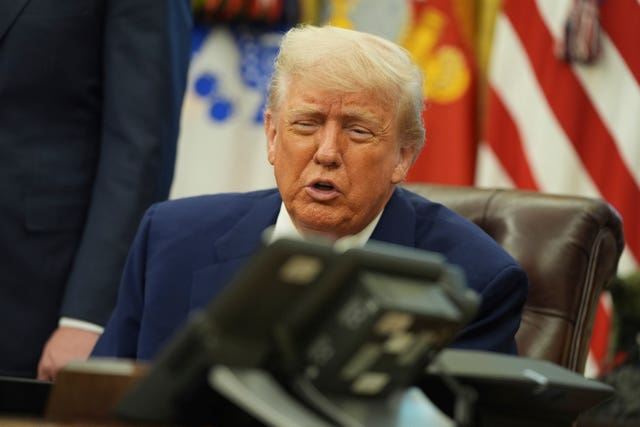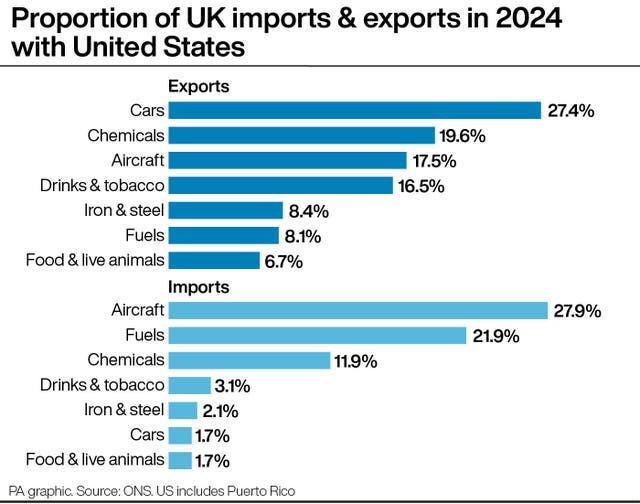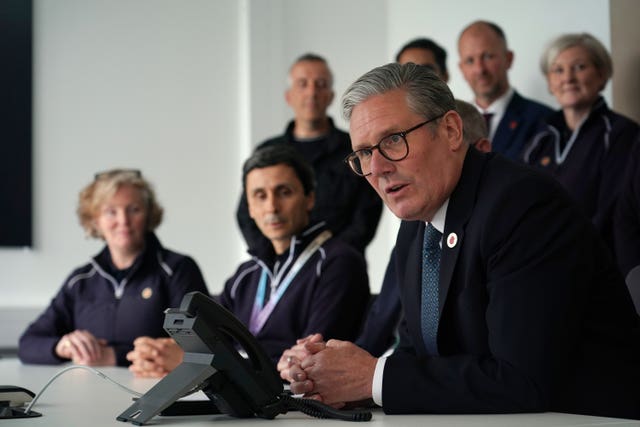Starmer says UK-US trade deal will save jobs in car and steel industries
US President Donald Trump confirmed the agreement in a call with Prime Minister Sir Keir Starmer which was broadcast live.

A “historic” UK-US trade deal will save thousands of jobs in the car and steel industries which have been threatened by Donald Trump’s tariffs, Sir Keir Starmer said.
The trade agreement was confirmed in a call between the Prime Minister and the US president which was broadcast live on both sides of the Atlantic.
US import taxes which had threatened to cripple British high-end carmakers were cut from 27.5% to 10%, while the 25% tariff on steel has also been removed entirely.
The blanket 10% tariff imposed on imports by Mr Trump as part of his sweeping “liberation day” announcement remains in place, but talks are ongoing in a UK effort to ease them.
Speaking to the Prime Minister from the White House, the US president said the agreement was a “great deal for both countries”.
But he said the “final details” of the agreement were still being “written up”.
The timing of the announcement came as a surprise, coinciding with VE Day where the Prime Minister was heavily involved in events to mark the 80th anniversary of the end of the Second World War in Europe.

Previous governments have attempted to secure a free trade agreement with the US, but with no success, however the impact of Mr Trump’s tariffs made it a high priority for Sir Keir.
Mr Trump said: “The US and UK have been working for years to try and make a deal and it never quite got there.
“It did with this Prime Minister, so I want to just congratulate you.”
Sir Keir said: “With this president and this Prime Minister we’ve managed to achieve what many people tried to achieve for many years, and I’m really pleased.”

The Prime Minister, who spoke to the president during a hastily-arranged visit to JLR’s car plant in Solihull, added: “This historic deal delivers for British business and British workers protecting thousands of British jobs in key sectors including car manufacturing and steel.
“My government has put Britain at the front of the queue because we want to work constructively with allies for mutual benefit rather than turning our back on the world.”
Writing in the Mirror on Thursday evening, Sir Keir said it was “important” to him to go back to JLR – which he visited in the days after tariffs were imposed – to “look those workers in the eye and tell them I had delivered on the promise I made to them in April”.
“British workers, businesses and families are my only priority,” he said. “I will always act in their interests.”
In an indication of why the Government felt it had to act rapidly to achieve benefits for the car and steel industries, Business Secretary Jonathan Reynolds indicated jobs were at imminent risk.
Mr Reynolds said the US was an important market to firms such as JLR, Aston Martin and Bentley and that a 25% tariff was a “very difficult business proposition” in a competitive industry.
The US president had previously described the deal as “full and comprehensive”, but Thursday’s announcement focused on a narrower set of industries.

Measures include:
– American tariffs on British cars fall to 10% for the first 100,000 vehicles exported to the US, while tariffs on steel are scrapped.
– The US has removed the 25% tariff rate on UK steel and aluminium exports, reducing the additional trade barrier for these goods to zero.
– Beef exports will be allowed both ways, with officials insisting there will be no weakening of food standards for meat sent to Britain.
– The UK will have “preferential treatment whatever happens in the future” when it comes to pharmaceuticals, as Mr Trump considers import taxes on drugs and medicines.
– The UK will also get preferential treatment in any further tariffs Mr Trump announces on national security grounds as part of his drive to protect US business.
Sir Keir also confirmed that there is “nothing in the deal that impinges” on free speech, after US vice president JD Vance criticised the UK and other European governments for their approach.
Steel union Community’s assistant general secretary Alasdair McDiarmid said the deal would protect jobs in the industry.
He said: “The UK Government deserves enormous credit for negotiating this deal to reduce US tariffs which would have had a hugely damaging impact on our steel sector.”
In exchange, the UK has reduced tariffs on US products including beef and ethanol, which US commerce secretary Howard Lutnick said would create five billion dollars in “opportunity for American exports”.
The agreement on beef provides a tariff-free quota for 13,000 tonnes of US exports, but the UK Government insisted this would involve no reduction in food standards.
Mr Lutnick added that British-made Rolls-Royce engines would be excluded from tariffs, with a UK airline agreeing to buy “10 billion worth of Boeing planes later today”.
Mr Trump said the UK would also be brought into “economic security alignment” with the US as a result of the deal.
Previous speculation had suggested the UK would revise the digital services tax as part of a deal, with the levy mainly applying to US tech companies.
But Number 10 said on Thursday the tax would remain unchanged, with the two countries agreeing to work on a separate digital trade deal that would reduce paperwork for British firms exporting to the US.
The deal with the UK is the first agreement since Mr Trump announced his “liberation day” tariffs on countries around the world.
Conservative leader Kemi Badenoch criticised the deal, saying Britain had been “shafted”.
She said: “When Labour negotiates, Britain loses. We cut our tariffs – America tripled theirs.”
Meanwhile, the Liberal Democrats demanded a vote on the deal in Parliament, saying it would show “complete disrespect to the public” if MPs were denied a say.
Sir Ed Davey said: “When it comes to any trade deal – and especially one with someone as unreliable as Donald Trump – the devil will be in the detail.
“One thing is clear, Trump’s trade tariffs are still hitting key British industries, threatening the livelihoods of people across the UK.”





